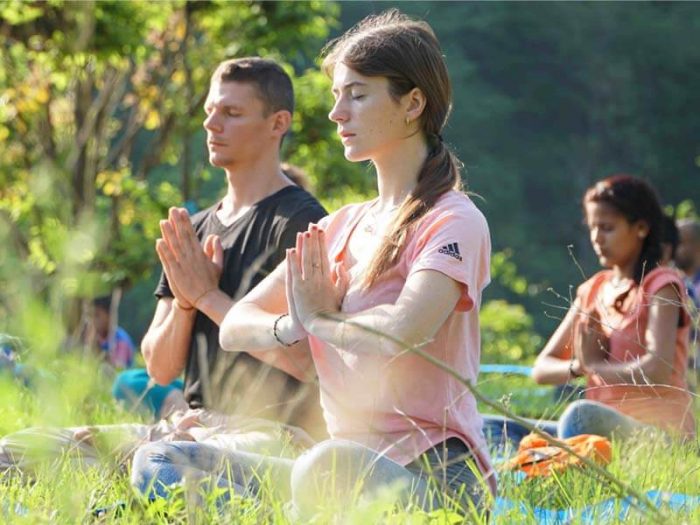For thousands of years, we have been taught “Self-ignorance” by our religion. Self-ignorance has been highly appreciated in our society. It may be a strange concept for the people who have been raised in an abusive or unloving home, environment and society.
According to Buddhist psychology, self-compassion is defined as a way of relating to the self with kindness, not with arrogance or conceit. These negative emotions actually indicate a lack of self-love while self-compassion entails being gentle, supportive and understanding. Self-compassion refers to being kind to the self in good times and bad times, in sickness, injuries, broken relationships, financial issues – and even when we make mistakes in personal and professional life. This is the quality that makes us recognize the difference between making a bad choice and being a bad person. Self-compassion is the way that truly establishes our unconditional worth in our life.
In the last decade, research has proven a strong correlation between the self-compassion and mental health of human beings. People having self-compassion also have greater social connectedness, emotionally healthy and complete life satisfaction. Self-compassion reduces anxiety, depression, embarrassment, and our greatest fear of failures like losing a competition, or the loss of a job. But, if we lose our sense of self-worth during these challenging times, we will have a hard time recovering. The quality of self-compassion is essential for healthy self-esteem and resilience for us.
The famous saying – “How you treat yourself reflects how you let others treat you”, defines the importance of self-compassion in life. People who suffer from self-criticism often reflect a pattern of unhealthy relationships. If you are suffering from self-criticism or unkind to yourself, then you are showing the path to accept the disrespect from others. As a result, you end up attracting a disrespectful relationship whether a friendship or a love relationship. If we are being unkind with ourselves, if we never give space to ourselves to make mistakes or benefit from the doubt, there is highly possible that we don’t give it others as well and will be unkind to others. When we have self-compassion, we think about others’ feelings and are less dependent on others for self-worth.
If we constantly neglect ourselves while adoring others, it will imbalance our life and leads towards self-criticism. When we have true compassion for ourselves, then it supports healthy, balanced and loving relationships.
How Yoga Can help us to cultivate the quality of Self-compassion
As designed above, self-compassion means to treat one’s self with the same loving, unconditional positive as we extend to others. It is about being our own loved one or best friend. It leads us towards self-care, personal growth, resilience, and more importantly self-worth with inner peace. And the best way is to cultivate this quality in ourselves is yoga practice. The Bhagavad Gita says, “Yoga is the journey of the self, through the self, to the self.” Yoga is the best method to connect with oneself. Here are some yoga and meditation practices that help you to cultivate self-compassion in your personality.
- Yoga Asana Practice – When you begin yoga posture practices, you start to love your body. On the very first day, yoga connects you with your body. The yoga postures can improve the sensitivity of the body and its connection with your inner being. Yoga posture practice aligns your different parts and in tune them in a perfect physiological system so that they function in the right order.
- Mindful Meditation Practice – This is one of the best techniques to cultivate self-compassion quality. Mindfulness Meditation is the practice of being fully present at the moment. It is the ability to be fully engaged with the present movement and free from distraction or judgment about the current situation or yourself. It allows you to be aware of your thoughts, feelings and not to be associated with them. When you practice mindfulness, it aligns your body, mind, and emotions and builds up a better synchronization with your inner being. It connects you with your real being and creates a sense of self-care and self-love.
- Build up a sense of a learning child – In the deeper yoga practice, you will be asked to treat yourself like a child. Although, many of us don’t allow ourselves to be a child. During our yoga practice, you were told to give compassion to yourself as you give to a little child.
- Give space yourself to be imperfect – In the above point#3, as a learning child, you need to give space to yourself to be imperfect. When you practice this technique, you will start accepting yourself as you are NOT as you want to be. It is all about cultivating a perspective over ourselves so we never lock ourselves down and resilient in every difficult situation and most importantly, it helps you to avoid self-criticism.
The biggest benefit of self-compassion is that it creates a sense of well-being. It transforms the suffering into inner peace, builds up the resilience. The modern research of neuroscience and neuroimaging are proving that meditation and deep breathing can bring self-compassion by changing the neural pathways. Experts advise that deeper mindfulness meditation techniques are really helpful to cultivate self-compassion in one’s personality. It helps us to grow spiritually by creating the self-love and self-care for – the good, the bad, the imperfect self. By being kind and gentle with ourselves, we can be compassionate to others. Real self-compassion makes the world a more benevolent and enjoyable place to live in. You need to start cultivating self-compassion practices with mindfulness meditation technique but before you dive in with deep meditation practices, we recommend you consult with a mentor who can guide you to practice different meditation techniques. The best place to find a good mentor for your meditation practices is a reputed yoga school in your area. You can also enroll in a yoga teacher training program or meditation retreat program that can help you to move on the path of true wisdom and enlightenment which is not possible without self-compassion.







Read 0 comments and reply